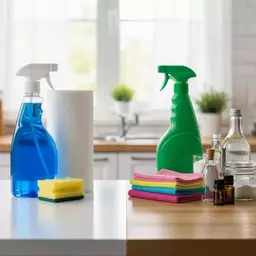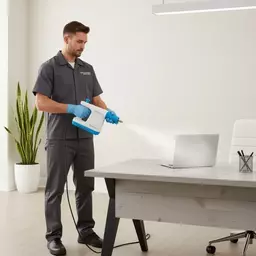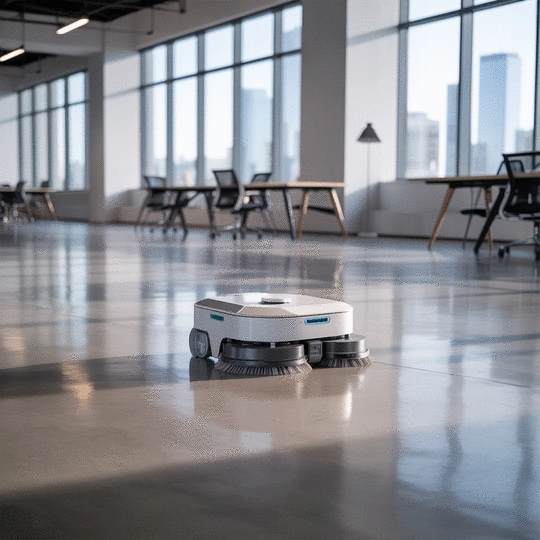Building Effective Training for Managers

Posted on: 2025-11-05
By: Catherine W. Devereux
Effective staff training is not just an operational requirement; it’s a strategic investment that shapes the future of facility management. The benefits are clear, and understanding them can transform your approach to training.
What You Will Learn
- Enhanced Efficiency: Trained employees can work faster and with fewer mistakes, boosting overall productivity.
- Improved Safety: A robust training program minimizes workplace accidents and ensures compliance with health regulations.
- Higher Employee Engagement: Investing in staff development fosters loyalty and decreases turnover rates.
- Skill Development: Comprehensive training equips employees with valuable skills, making them more versatile and effective in their roles.
- Continuous Improvement Culture: Establishing a culture of learning promotes ongoing professional development and responsiveness to industry changes.
- Customized Training Plans: Tailoring programs to specific roles ensures that all team members receive relevant training that meets their unique needs.
- Networking Opportunities: Professional development activities provide avenues for staff to connect, share insights, and learn from peers.
Path to Facility Management Excellence: Training Program Steps & Benefits
This visual outlines the key steps to develop a comprehensive staff training program and highlights the benefits of effective training within facility management.
Key Steps to Develop a Training Program
- •Assessment of Skills Gaps
- •Customized Training Plans
- •Blended Learning Approaches
- •Continuous Evaluation
- •Emphasis on Soft Skills
Key Benefits of Effective Training
- •Improved Efficiency & Productivity
- •Enhanced Safety & Compliance
- •Better Employee Engagement
- •Increased Skill Development
- •Higher Customer Satisfaction
Understanding the Importance of a Staff Training Program for Facility Managers
In the realm of facility management, effective staff training is not just beneficial—it's essential! As a facility manager, you’re tasked with maintaining a clean, safe, and efficient workspace, and the success of this endeavor hinges on how well your team is trained. A robust training program ensures that your staff is well-equipped to handle the evolving challenges of our industry. For more details on crucial skills, check out essential skills for cleaning training.
But why does effective training matter so much? A well-trained team is more adept at using the latest cleaning technologies, complying with safety regulations, and fostering a positive workplace culture. When we invest time in training, we are investing in the very foundation of our operations!

Why Effective Training Matters in Facility Management
Effective training lays the groundwork for operational excellence. It equips staff with the necessary skills and knowledge to perform their duties confidently and efficiently. Here are several reasons why focusing on training is crucial:
- Improved Efficiency: Trained employees can work faster and with fewer errors.
- Enhanced Safety: Training reduces workplace accidents and ensures compliance with health regulations.
- Better Employee Engagement: Investing in staff development fosters loyalty and reduces turnover.
At PristineForce, we understand that a comprehensive training program forms the backbone of successful facility management. It's about creating a culture of continuous improvement that supports both the staff and the organization as a whole.
Key Benefits of a Comprehensive Training Program
A comprehensive training program offers a multitude of benefits that extend beyond just improved operational metrics. Here are some key advantages to consider:
- Skill Development: Employees gain valuable skills, making them more versatile in their roles.
- Increased Productivity: Trained staff can perform tasks more quickly and efficiently.
- Customer Satisfaction: Well-trained employees deliver better service, leading to happier clients.
By implementing a structured training framework, we can ensure that our team members feel confident and competent in their roles, ultimately translating into higher satisfaction levels for both employees and clients alike. This approach enhances the overall quality of service, as further discussed in our article on enhancing workplace safety with disinfection.
Role of Professional Development in Enhancing Facility Management
Professional development plays a pivotal role in enhancing the capabilities of facility management teams. It’s not just about initial training; ongoing education is vital for keeping up with industry standards. Consider these points:
- Industry Trends: Regular training keeps the team updated on the latest cleaning technologies and methodologies.
- Networking Opportunities: Professional development often includes conferences and workshops, allowing staff to connect with peers and share insights.
- Career Advancement: Training programs can prepare employees for higher positions within the organization.
At PristineForce, we believe in empowering our team through professional development. This commitment not only enhances our operational capabilities but also contributes to a safer and more productive workplace environment. Investing in our staff is an investment in our future success!
Pro Tip
To maximize the effectiveness of your staff training program, consider integrating real-world scenarios into your training sessions. This hands-on approach not only reinforces learning but also helps employees apply their skills in practical situations, leading to greater confidence and competence in their roles.
Summarizing the Steps to Develop a Comprehensive Training Program
Creating an effective staff training program is vital for enhancing facility management practices. At PristineForce, we emphasize the importance of a structured approach that encompasses various key elements. So, let's recap some of these essential components that will help you craft a training program that truly works for your team!
Recap of Key Elements for Effective Staff Training
- Assessment of Skills Gaps: Start by identifying the areas where your team might lack proficiency.
- Customized Training Plans: Tailor your programs to meet the specific needs of different roles and seniority levels.
- Blended Learning Approaches: Incorporate both eLearning tools and hands-on workshops to enhance learning.
- Continuous Evaluation: Implement metrics to assess training effectiveness and make necessary adjustments.
- Emphasis on Soft Skills: Don’t forget to include training that fosters leadership and team management abilities.
By focusing on these elements, you’ll be on your way to developing a robust training program that addresses both technical and soft skills, making your facility management team more effective and adaptive.

Maintaining Flexibility and Adaptability in Training Programs
In the ever-evolving world of facility management, flexibility is key! Training programs should not be static; they need to evolve based on emerging trends, regulatory changes, and feedback from team members. By regularly reviewing and updating your training content, you'll ensure that your staff is equipped with the latest knowledge and best practices.
Moreover, fostering an adaptable mindset among your team encourages them to embrace learning as an ongoing journey. This way, they can navigate changes more effectively, whether that’s integrating new technologies or complying with updated health standards, which is particularly relevant when onboarding commercial cleaning staff effectively.
Encouraging Continuous Improvement in Facility Management Training
At PristineForce, we believe that continuous improvement is essential for the growth of any facility management team. Establishing a culture of learning isn’t just beneficial; it’s vital for maintaining high standards in your organization.
Fostering a Culture of Learning and Development
- Regular Training Sessions: Schedule ongoing training opportunities to keep skills sharp.
- Encouraging Peer-to-Peer Learning: Promote mentorship programs where experienced staff can share their insights with newer colleagues.
- Access to Resources: Provide access to industry articles, webinars, and workshops that can enhance knowledge.
When your team feels supported in their professional development, it creates a more engaged and motivated workforce. This, in turn, results in improved performance and enhanced workplace culture!
Knowledge Sharing and Employee Engagement Strategies
Engagement doesn’t stop after training sessions! Encouraging knowledge sharing is essential for promoting an ongoing dialogue within your team. Consider implementing regular meetings or forums where staff can discuss challenges and share solutions they’ve discovered in their roles.
You can also utilize technology to facilitate these discussions. Online platforms can be great for creating communities where team members can exchange ideas, ask questions, and celebrate successes together.
Call to Action: Start Building Your Staff Training Program Today
Are you ready to revolutionize your training approach? Start building your staff training program today with insights from PristineForce! Remember, it’s not just about training; it’s about fostering an environment of growth and resilience. Let’s work together to elevate your facility management practices and create a brighter, more efficient workplace for everyone involved!
Recap of Key Points
Here is a quick recap of the important points discussed in the article:
- Effective Staff Training: Essential for maintaining a clean, safe, and efficient workspace.
- Improved Efficiency: Trained employees work faster and with fewer errors.
- Enhanced Safety: Reduces workplace accidents and ensures compliance with health regulations.
- Skill Development: Comprehensive training programs help employees gain valuable skills.
- Continuous Evaluation: Regularly assess training effectiveness and adapt programs accordingly.
- Cultivating a Learning Culture: Encourage ongoing training and knowledge sharing among staff.
Frequently Asked Questions (FAQs)
Why is staff training essential in facility management?
Effective staff training in facility management is crucial because it leads to enhanced efficiency, improved safety, higher employee engagement, and continuous skill development. It ensures staff are equipped to handle evolving challenges and maintain a clean, safe, and efficient workspace.
What are the key benefits of a comprehensive training program?
A comprehensive training program offers numerous benefits, including improved efficiency and productivity, enhanced safety and compliance, better employee engagement, increased skill development, and higher customer satisfaction. It also helps foster a culture of continuous improvement.
How can facility managers develop an effective training program?
To develop an effective training program, facility managers should assess skills gaps, create customized training plans, use blended learning approaches (e.g., eLearning and hands-on workshops), implement continuous evaluation, and emphasize soft skills like leadership and team management.
What is the role of professional development in facility management?
Professional development is vital for keeping facility management teams updated on industry trends, new technologies, and methodologies. It provides networking opportunities, supports career advancement, and helps adapt to regulatory changes, contributing to a more capable and productive workforce.
How can a culture of continuous improvement be fostered in facility management?
Fostering a culture of continuous improvement involves scheduling regular training sessions, encouraging peer-to-peer learning through mentorship, and providing access to resources like industry articles and webinars. Encouraging knowledge sharing and discussions also helps maintain an engaged and motivated workforce.
 What if your cleaning routine could contribute to a healthier planet? By understanding the differenc
What if your cleaning routine could contribute to a healthier planet? By understanding the differenc
 In today’s fast-paced business environment, cleanliness isn’t just a luxury; it’s a necessity.
In today’s fast-paced business environment, cleanliness isn’t just a luxury; it’s a necessity.
 Effective staff training is not just an operational requirement; it’s a strategic investment that
Effective staff training is not just an operational requirement; it’s a strategic investment that
